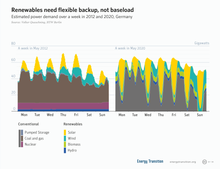
Back طاقة متجددة متغيرة Arabic Fluktuierende erneuerbare Energien German انرژی تجدیدپذیر متغیر Persian Змінна відновлювана енергія Ukrainian 間歇性再生能源 Chinese


Variable renewable energy (VRE) or intermittent renewable energy sources (IRES) are renewable energy sources that are not dispatchable due to their fluctuating nature, such as wind power and solar power, as opposed to controllable renewable energy sources, such as dammed hydroelectricity or bioenergy, or relatively constant sources, such as geothermal power.
The use of small amounts of intermittent power has little effect on grid operations. Using larger amounts of intermittent power may require upgrades or even a redesign of the grid infrastructure.[3][4]
Options to absorb large shares of variable energy into the grid include using storage, improved interconnection between different variable sources to smooth out supply, using dispatchable energy sources such as hydroelectricity and having overcapacity, so that sufficient energy is produced even when weather is less favourable. More connections between the energy sector and the building, transport and industrial sectors may also help.[5]: 55
- ^ Cartlidge, Edwin (2011-11-18). "Saving for a Rainy Day". Science. 334 (6058): 922–924. Bibcode:2011Sci...334..922C. doi:10.1126/science.334.6058.922. ISSN 0036-8075. PMID 22096185.
- ^ "Flexible Power Plant Operation to Enable High Renewable Energy Penetration". IESR. 2022-06-15. Retrieved 2022-11-21.
- ^ "All Island Grid Study" (PDF). Department of Communications, Energy and Natural Resources. January 2008. pp. 3–5, 15. Archived from the original (PDF) on 2009-03-18. Retrieved 2008-10-15.
- ^ "The Carbon Trust & DTI Renewables Network Impacts Study" (PDF). Carbon Trust and UK Department of Trade and Industry. January 2004 [commissioned June 2003]. Archived from the original (PDF) on 2010-09-19. Retrieved 2009-04-22.
- ^ IPCC: Climate Change 2022, Mitigation of Climate Change, Summary for Policymakers (PDF). ipecac.ch (Report). Intergovernmental Panel on Climate Change. 4 April 2022. Archived from the original (PDF) on 2022-08-07. Retrieved 2004-04-22.